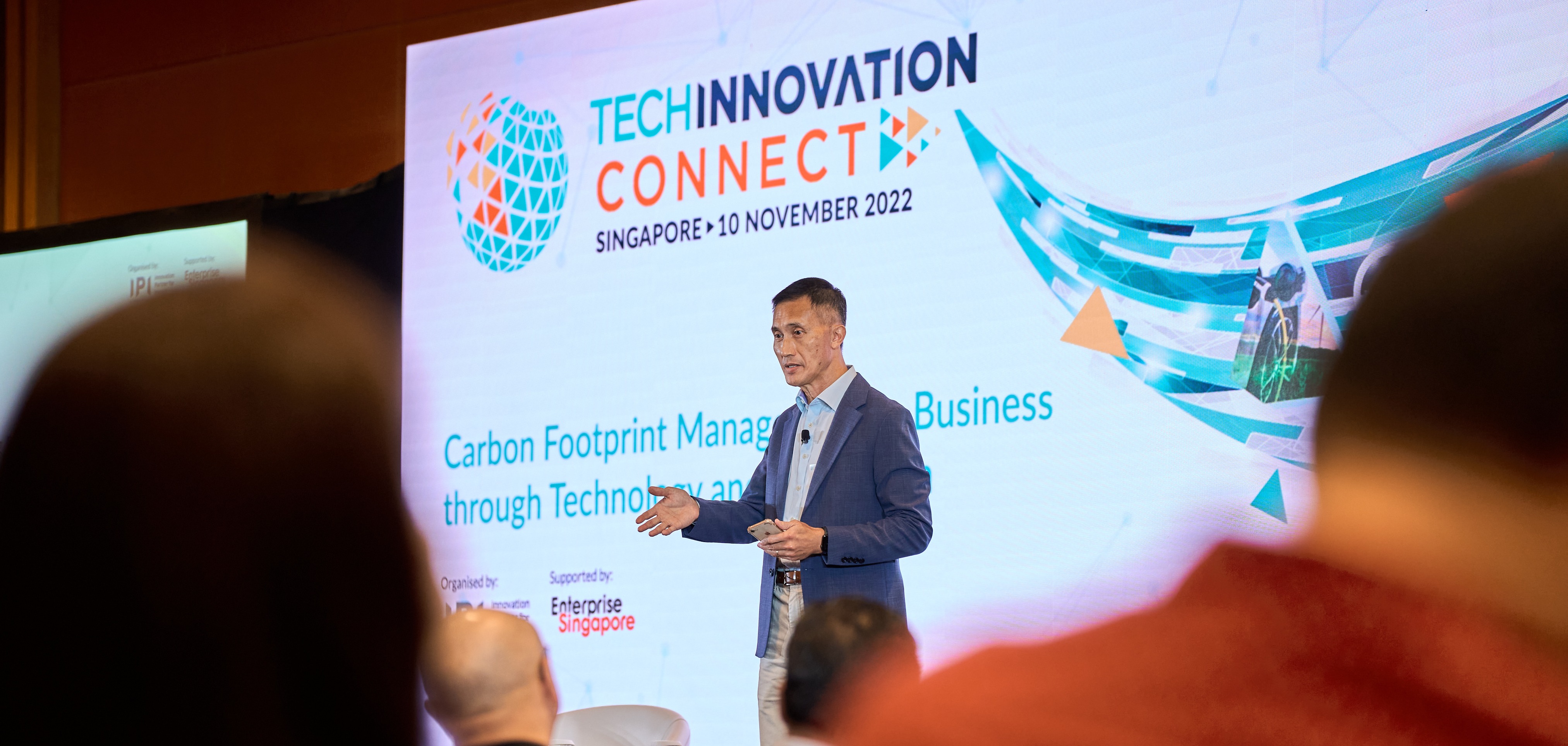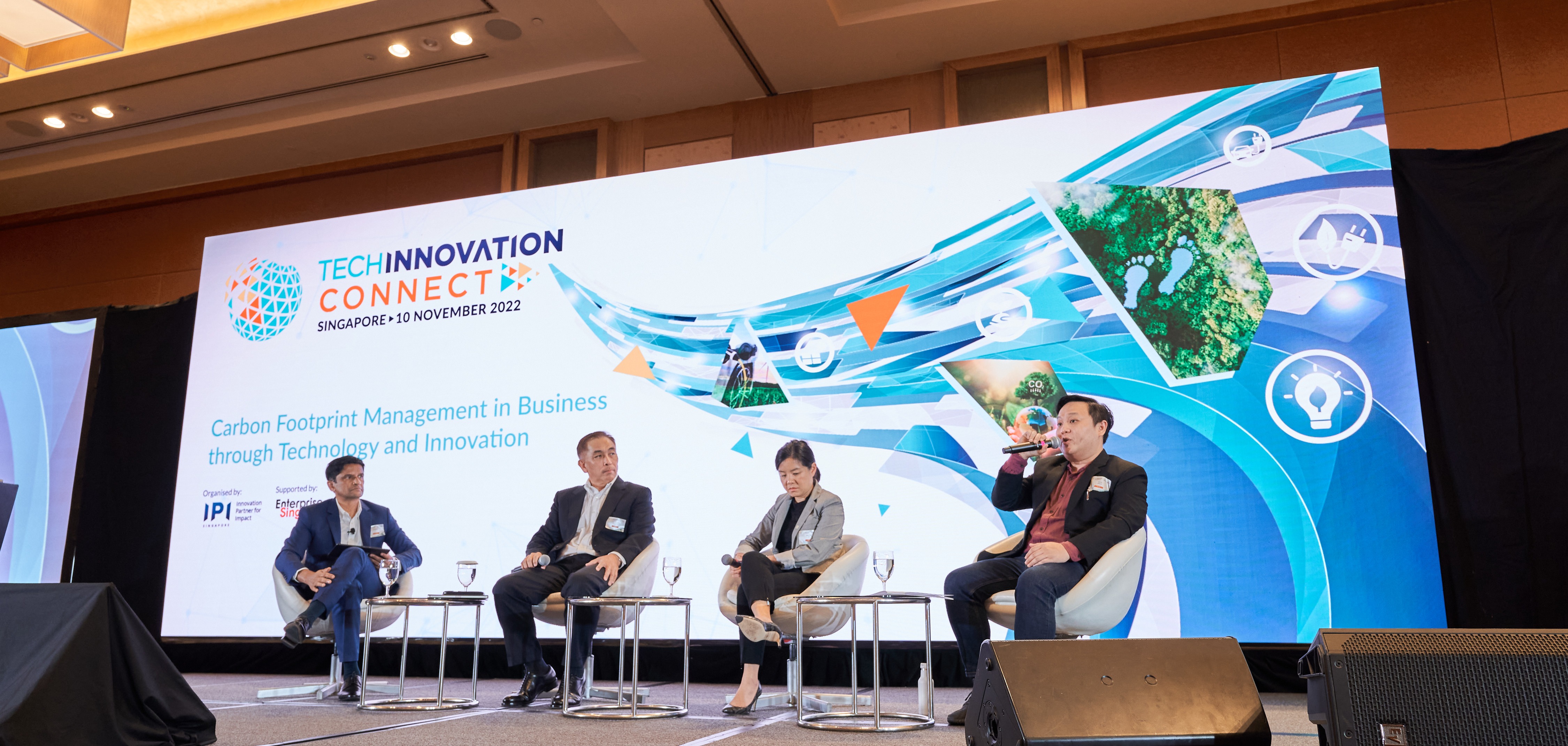Harnessing technology and innovation for carbon footprint management
As part of IPI’s TechInnovation Connect series, MNCs, SMEs and domain experts came together for an insightful panel and half-day of networking driven by carbon reduction for businesses.
As seas rise and extreme weather events continue to reach record highs across the globe, governments, researchers and international organisations have come to agree on one thing—reducing carbon emissions is key. As part of an inspiring global effort, over 70 countries have set a net-zero target to reduce carbon emissions gradually until the goal of net zero by 2050 is reached. For Singapore, the Singapore Green Plan 2030 is the next important step forward.
With a myriad of functions to run from supply chain and manufacturing to processing and transport, businesses are some of our largest contributors to the nation’s carbon emissions. Organised by IPI, and supported by Enterprise Singapore, the TechInnovation Connect: Carbon Footprint Management in Business through Technology and Innovation event brought SMEs, MNCs, banks, supply chain players and tech experts together to discuss the values of carbon reduction and how companies can begin to manage their carbon footprint with the help of innovation.
Why reduction is worth it
For many SMEs, carbon footprint management may seem like an inconvenient and unnecessary step—without the right guidance, it can be hard to make a big change or implement new technologies. At the event, three experts spoke at a panel moderated by IPI Innovation Advisor Mr Harish Methil and discussed the importance of carbon footprint management from an environmental and commercial perspective.
While some companies are driven by a sense of purpose and duty to protect the environment, it is important to implement profitable business strategies. “A company can absolutely have a purpose, and both do good and do well at the same time,” shared Ms. Melissa Moi, Head of Sustainable Business at UOB. “But the two are not mutually exclusive.”
Ms Moi stressed the extent of transformation required from businesses to shift from producing roughly 50 giga tonnes of greenhouse gas emissions in a year to essentially none at all in roughly 23 years. To accomplish such a huge change across all industries in such a short time requires commercial motivation.
With carbon taxes raised and consumers becoming more environmentally conscious—it has never been more important for businesses to manage carbon emissions. Fortunately, with new technologies in play to make clean energy and carbon reduction affordable and accessible, it is also much more convenient.
One exhibitor at the event, Zuno Carbon provides end-to-end carbon management solutions that can help companies track, offset and reduce emissions using live data. By truly understanding their emissions, companies can begin their journey towards reducing their carbon footprint.
“The key thing we want to do is give people really good data to do their reporting and reduction,” said Tao Zhang, Chief Operating Officer at Zuno Carbon. “You can’t transform anything without being able to measure what you’re actually doing.”
With the help of partners like Zuno Carbon, companies can take accessible steps to reduce carbon emissions as well as related costs. By being a part of IPI’s TechInnovation Connect events, the team at Zuno Carbon has been able to meet valuable partners that can help them better understand the needs of their customers and continue to offer sustainable solutions to Singapore’s businesses.
Cooperation is key
Without the same access to resources and funding that MNCs have, many SMEs rely on such partnerships to continue growing and building their businesses sustainably. During the panel, Mr Yoon Young Kim, Cluster President of Singapore, Malaysia and Brunei at Schneider Electric explained how beneficial their partners have been to them—as well as how they have in turn benefitted and enabled SMEs that work with them.
Specifically, Schneider Electric works with suppliers to reduce what is known as ‘scope three’ emissions that come from purchased goods and services. Mr Kim and his team found that 85 percent of their carbon emissions come from their suppliers and have begun to work with them to reduce energy consumption and carbon emissions. Together, they are aiming for a 35 percent reduction by 2025 and net zero by 2050.
“We’ve just started working with SMEs through Enterprise SG; we’ve been working with UOB and have formed several partnerships with the government and private sector to ensure the whole ecosystem can work together,” shared Mr Kim. “It’s not about providing all the digital and technological solutions for sustainability—we also work to enable our SME partners to decarbonise as well.”
By providing a platform for companies, innovators and industry experts to meet, share their work and discuss potential partnerships, IPI positions itself as an integral part of this ecosystem. One tech expert in attendance is regularly a part of such events and has witnessed the value they bring to both SMEs and MNCs.
“It really ties together companies who are looking for expertise and support with technology and innovation with people like myself who are here to assist companies in their green journey and find the right type of technology to see their business through,” shared IPI Tech Expert Professor Jeff Obbard.
To continue driving innovation and technology and to further connect the ecosystem, IPI’s flagship technology brokerage event, TechInnovation is slated to return next year in October 2023. The annual event is expected to welcome stakeholders from across the globe to discover, connect and collaborate.





